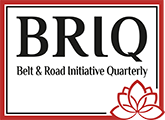
Belt & Road Initiative Quarterly (BRIQ) is currently seeking submissions for a special issue on “Cultural Cooperation under the Belt & Road Initiative: On the Occasion of UNESCO’s Celebration of 2021 as the Year of Yunus Emre”.
The Belt & Road Initiative (BRI) seeks to develop a shared conception of the world, particularly for Asian and Eurasian countries, which would provide ample opportunities for the construction of strong and solidaristic bridges between independent states and peoples. For thousands of years, peoples living in the Global South have come to create shared human values despite a long history of conflicts. This being said, imperialism has been a major source of conflicts that serve to undermine such values. One should acknowledge that imperialism as a world-system is built on strong cultural dynamics, and certainly, developing countries involved in the Belt & Road Initiative face the cultural assaults of imperialism and struggle to retain their cultural and intellectual heritage, while seeking to strengthen cultural bonds of cooperation, solidarity, and trust between peoples.
In this regard, Yunus Emre, whose historical relevance is acknowledged by UNESCO celebrating 2021 as the Year of Yunus Emre, appears as a strong symbol of the Asian Age. Yunus Emre’s work emphasizes the universal aspects of different cultures and cultural cooperation in the Eurasian region. His legacy, which can be summarized in his dictum “looking at seventy-two different nations with the same eye” and his agelong philosophy of “Come, let us all be friends for once/ Let us make life easy on us/ Let us be lovers and loved ones/ The earth shall be left to no one”, may serve as a springboard for revealing shared values between different cultures of the Global South, notably the strong bonds between the Islamic and Turkish values and other civilizations such as the Russian, Persian, Arabian, Chinese and Indian civilizations. UNESCO’s “Yunus Emre Year” helps us to revive the shared values of the Global South around tolerance, peace, friendship and happiness without selfishness.
Based on the context depicted above, BRIQ calls for academic articles, essays and book reviews that address issues related to cultural cooperation in the Global South:
- Cultural studies on bridging different cultures in a universal context for the success of political formations and developments in the countries of the BRI and other developing regions,
- Studies on opportunities for appreciating the shared understanding of humanity in different cultures (Turkish, Persian, Arabian, Russian, Chinese, Latin American etc.),
- Programmes to develop cooperation for stronger cultural solidarity and dialogue among the countries of the BRI,
- The importance of culture, arts, literature, and fine arts for global cooperation in the 21st century,
- Papers that address the potential of philosophy, including that of Yunus Emre, to help improve the cooperation of BRI countries and build a better human civilization.
Deadline for Paper Submissions: July 15, 2021
Submission Guidelines
BRIQ (Belt & Road Initiative Quarterly) is a scholarly journal of international politics, economy, and culture.
Belt and Road Initiative Quarterly (BRIQ) features a broad range of content, from academic articles to book reviews, review essays, interviews, news reports, and feature articles.
The Editorial Board can issue calls for papers for special issues and invite authors to contribute manuscripts; however, it also welcomes unsolicited submissions.
Submissions are invited in English or Turkish. All submissions are to include a short biography (150-word limit) and should be sent as Microsoft Word attachments to briq@briqjournal.com . Articles or other content that have been previously published or are under review by other journals will not be considered for publication.
BRIQ follows American Psychology Association style (6th edition, https://www.apastyle.org) and uses American English spelling.
BRIQ uses a double-blind review process for all academic articles.
Academic articles should be between 5,000 and 9,000 words in length, including abstracts, notes, references, and all other content. Please supply a cover page that includes complete author information, and a fully anonymized manuscript that also contains an abstract (200- word limit) and 5 keywords.
Book reviews should not exceed 1,000 words; review essays covering two or more works can be up to 3,000 words.
News reports consisting of brief analyses of news developments should not exceed 1,500 words; feature articles combining reporting and analysis can be up to 3,500 words.
Please contact the Editorial Board for interview proposals.
